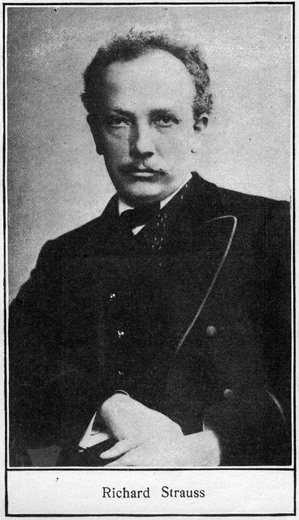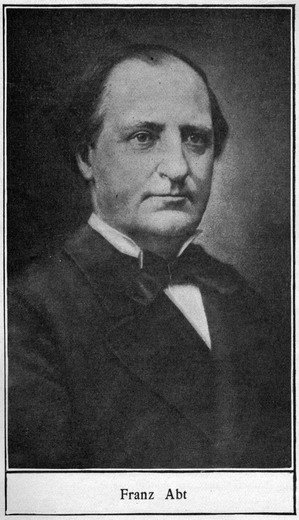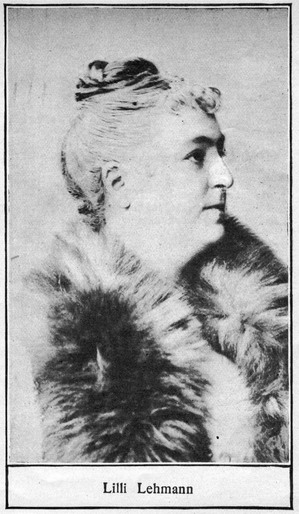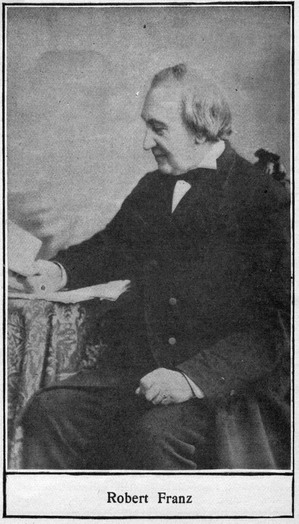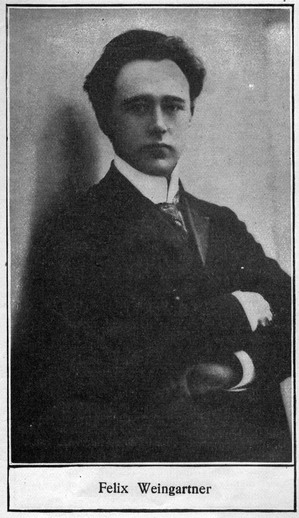 PAUL FELIX WEINGARTNER.
PAUL FELIX WEINGARTNER.
(Vine-gart-ner.)
Weingartner was born June 2, 1863, at Zara in Dalmatia, Austria. He studied composition at Gratz under Remy, but gave up his musical work in 1881 to enter the University of Leipsic, where he studied philosophy. He soon gave this up, however, and went to the Conservatory of Music. In 1863 he became a pupil of Liszt at Weimar, and there brought out his first opera, entitled Sakuntala, a year later. The same year he became Capellmeister at Königsberg. In 1885 he removed to Danzig, where he held a similar position for two years. He subsequently spent two years at Hamburg and two at Mannheim. Weingartner’s reputation as a conductor was now such that in 1891 he was appointed Court Capellmeister of the Opera at Berlin, and also director of the symphony concerts of the royal orchestra. His modern style of conducting met with a good deal of opposition among the more conservative musicians, and in 1898 he resigned and went to live in Munich, where he became conductor of the Kaim concerts. When Gustav Mahler resigned from the Vienna Court Opera, Weingartner was appointed as his successor, and he still holds this position. Though his chief reputation has been gained as a conductor, he is, nevertheless, an excellent composer, and the author of several works on musical matters. His compositions include three operas, symphonies, string quartets, songs, etc., and his literary works include a treatise on conducting.
Strauss was born at Munich, June 11, 1864. His father was a horn player, and the boy early showed signs of musical genius. He commenced composing at six, and many of his boyish works received public performance—indeed, his symphony in F was performed in New York, under Theodore Thomas, in 1884. Von Bülow and Alexander Ritter had great influence on his earlier musical life; one taught him to understand Brahms and the other set him on the paths of modernism. He has acted as Capellmeister at Munich, Weimer and later at Berlin, but his work as a conductor is overshadowed by his success as a composer. Up to and including the tone-poem, Tod und Verklärung, his compositions are more or less classic in form, though often remarkable in character. Since then his works have been such that a written program is needed to understand their nature. The “tone-poems,” Till Eulenspiegel, Also Sprach Zarathrustra, Don Quixote, Ein Heldenleben and the Sinfonia Domestica, have each in turn been the subject of vituperative discussion unequaled since the days of Wagner. His first opera, Guntram, was performed in 1894, and he married the lady who took the leading rôle. Since then Salome and Elektra have caused voluminous discussion. His latest opera, the Rosen Kavalier, is less extravagant than either Salome, Elektra or Feuersnot. Many of his songs are exceedingly beautiful.
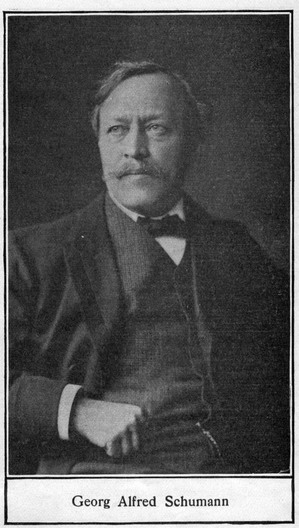 GEORG ALFRED SCHUMANN.
GEORG ALFRED SCHUMANN.
(Shoomahn.)
Georg Schumann was born at Konig- sfein on the Elbe, October 25, 1866. He, studied the violin with his father and the organ with his grandfather to such good effect that he played in the orchestra when he was nine, and acted as organist at the age of twelve. After studying in Dresden, he went to Leipsic Conservatory from 1881 to 1888. For a while he lived at Danzig, where he conducted a choral society, and in 1896 was appointed director of the Philharmonic choir and orchestra in Bremen. He remained there until 1899, but in 1900 he was appointed a royal Professor and made head of the Singakademie in Berlin. Unlike his great namesake, Robert Schumann, Georg Schumann is not very radical as a composer. He belongs to the more conservative of the two great parties in Berlin to-day. He has written music in all forms except opera, his principal works in the larger form being an overture, Fruhlingsliebe, and a symphony in F minor. He has also composed choral music and much chamber music, etc. It is possible that many are familiar with his Mazurka for piano. He is well known as a teacher of piano in Berlin and plays a prominent part in the musical affairs of the German capital. Georg Schumann is remarkable for his sound musicianship and the originality of his ideas along lines totally different from those of the brilliant Richard Strauss.
Franz Abt was born at Eilenburg, Prussian Saxony, December 22, 1819, and died at Wiesbaden, March 31, 1885. His father was a clergyman, and intended his son for the same profession, though he permitted him to study music. Abt studied at the Thomasschule and University of Leipsic, and on the death of his father adopted the musical profession. He was appointed capellmeister at Benburg, and later at Zürich (1841), where he was busily engaged as conductor to various singing societies. In 1852 he became a member of the staff of the Hof-theater at Brunswick, and he was leading capellmeister until his retirement in 1882. As a composer, Abt was fluent and correct, but wrote nothing of any permanent value with the possible exception of one of his songs, When the Swallows Homeward Fly. At one time this song had a great vogue, but is rarely heard nowadays. Abt was especially fond of writing male voice choruses, and as he was a favorite director for organizations of this kind, he had ample opportunity to indulge his taste. He also produced a singing method which is still very popular. Altogether Abt produced over 400 compositions of various kinds, mostly choral, many of which attained wide popularity in Switzerland and Germany in their day, but are now nearly all forgotten. He also produced many pieces for the piano, but as they were of a somewhat superficial character, they are seldom heard.
Lilli Lehmann was born at Würzburg, May 15, 1848. Her teacher was her mother, Marie Lehmann, formerly a harp player and prima donna at Cassel under Spohr. The daughter made her first appearance at Prague, in the Magic Flute. Later she appeared at Dantzig (1868) and Leipsic (1870). She made her début in Berlin in 1870 with such success that she remained there as a coloratura soprano until 1885. She afterwards became a dramatic soprano. In 1876 she sang the principal parts in the first Wagner recital at Bayreuth. In the same year she was appointed Imperial chamber singer. She appeared as Isolde at Covent Garden, London, in 1884, and a year later came to America and sang in German opera until 1890, making a trip in 1887 over to England, where she was very popular. In 1890 she returned to Germany, singing both in opera and in concert. In 1899 she reappeared at Covent Garden as Fidelio, Sieglinde, Norma, Isolde, Ortrud and Donna Anna. She appeared in Paris in 1903 and sang at the Lamoureux concerts. Mme. Lehmann enjoys the distinction of having been the greatest Wagnerian singer of her time, her chief success being in the rôles of Brunhilda and Isolde. At the same time she has won an enviable reputation as a concert singer. It is interesting to know that she is deeply interested in humanitarian projects, and is known throughout Germany as a protectress of animals.
Franz was born June 28, 1815, and died October 24, 1892, at Halle, the birthplace of Handel. His family name of Knauth was changed by royal permission in 1847. His parents endeavored to prevent him from adopting a musical career, but finally permitted him to complete his musical education at Dessau, 1835-37, where he was a pupil of Schneider. He returned to Halle, and for same time was unable to find musical employment or even a publisher for his songs. He spent most of his time diligently studying Bach, Beethoven and Schubert. In 1843 he published his first set of twelve songs. These attracted the attention of Schumann, then editor of the Neue Zeitschrift and also aroused the interest of Liszt, Mendelssohn and Gade. Franz was appointed organist at the Ulrichaskirche, and conductor of the Singakademie in Halle. He also lectured at the University of Halle and received the titles of Doctor of Music and Königlicher Musikdirector. Unfortunately, his hearing, which had begun to fail as early as 1841, became so bad that in 1868 he was obliged to give up his work. His nervous condition was also very serious, and in consequence he got into pecuniary difficulties. Thanks to Liszt, Joachim and others, however, a fund about $25,000 was realized at a benefit concert and presented to him. As a writer of songs Franz stands side by side with Schubert and Schumann. He composed 257 songs.


